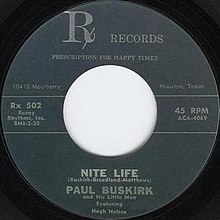Background and recording
After his son Billy was born in 1958, struggling with financial issues, Nelson moved to Houston. On the way, Nelson stopped by the Esquire Ballroom to sell songs to house band singer Larry Butler. Butler refused to purchase Nelson's songs, giving him instead a $50 loan to rent an apartment and a six-night job singing in the club. Nelson rented an apartment near Houston in Pasadena, Texas, where he also worked at a local radio station as a DJ. During this time, Nelson recorded for Pappy Daily of D Records. While working at the club, Nelson used the time during the thirty-mile commute from his home to the club to write songs. One night he was inspired after thinking of the line "When the evening sun goes down, you will find me hanging 'round." Nelson's inspiration was completed on his way back, with the line "The night life ain't no good life, but it's my life."
Nelson sold the song for $150 to Paul Buskirk in 1960, while working at his school as a guitar instructor. Produced by Bill Quinn, Nelson recorded the song at Gold Star Studios. The session band was composed of guitarist Buskirk, bassist Dean Reynolds, drummer Al Hagy, pianist Bob Whitford, steel guitarist Herb Remington, and Dick Shannon on saxophone and vibraphone.
The song was rejected by Pappy Daily, who did not consider it country. Nelson, who owed Daily the recording of other songs, had sold "Night Life" for enough money to master the record at another studio. Daily threatened to sue Nelson if he pressed the song. Nelson and Buskirk took the tapes from Gold Star Studios, and went to Bill Holford's ACA Studios to master the recording. The song was recorded as "Nite Life," and credited to "Paul Buskirk and the Little Men featuring Hugh Nelson." Released through Rx Records, few copies of the single were pressed, and it received limited airplay by DJ Uncle Hank Craig on XEG. [6]
Later recordings
In 1960 Ray Price purchased the song and recorded a cover of it as the title track of his 1963 album Night Life . The song became a hit for Price who started to use it as the introduction in his shows, replacing the usual backing fiddles. Price said in the introduction to the song that it was "especially" written for him by "a boy down Texas way." [10] The single reached number 28 on the Billboard Hot Country Singles chart. [11] That same year, Doris Day also recorded the song for her Columbia Records album, Love Him .
The original 1960 recording by Nelson was re-released as "Night Life," for the first time under his own name, on Bellaire Records in 1963, along with its original B-side, "Rainy Day Blues." Later, it was included on the 2000 Bear Family Records compilation The Complete D Singles Collection.
Al Hirt included the song in his 1964 LP Sugar Lips , singing the verses and playing behind the chorus. In 1965, Nelson recorded the song for his RCA Victor release, Country Willie – His Own Songs . The liner notes of the album stated that "Willie writes the songs...You make them into hits," detailing the songs written by Nelson that were hits for other artists including Ray Price's recording of "Night Life."
In 1969, "Night Life" was covered by Stan Webb, the singer with Chicken Shack and issued as the B-side to a well-received cover of "I'd Rather Go Blind," sung by Christine Perfect (better known as Christine McVie, of Fleetwood Mac fame).
The song was covered by several other artists including Aretha Franklin, B.B. King, Dottie West, Don Ho, and Rusty Draper. It was a recurring staple of B.B. King's career, being featured on the live album Blues Is King and a single released around the same time. King later re-recorded it on Love Me Tender as a medley with "Please Send Me Someone to Love" (this medley is also featured on Live at the Apollo ). Finally, on Deuces Wild , B.B. performed the song as a duet with Willie Nelson himself.
Dolly Parton performed the song on television twice: on her 1970s variety show Dolly! , and again on her 1980s variety show Dolly .
Crystal Gayle performed Night Life, accompanied by B.B. King on guitar, on her first CBS TV show, The Crystal Gayle Special (1979).
The song "Night Life," on the 1974 Thin Lizzy album Nightlife , borrows the title and chorus of the Willie Nelson song, but Thin Lizzy lead singer Phil Lynott is credited as the song's sole writer. [14]
A version recorded by Nelson and trumpeter Danny Davis in 1979 reached number 20 on the Billboard Hot Country Singles chart in 1980, and number 9 on the RPM Country Tracks chart. [16] A cover by B.J. Thomas peaked at number 59 on the Billboard Hot Country Singles chart in 1986. [17] David Lee Roth released the song as a single from his 1994 album Your Filthy Little Mouth . Aretha Franklin released a cover on her 1998 album The Delta Meets Detroit .
"A Song for You" is a song written and originally recorded by rock singer and pianist Leon Russell for his first solo album Leon Russell, which was released in 1970 on Shelter Records. A slow, pained plea for forgiveness and understanding from an estranged lover, the tune is one of Russell's best-known compositions. Russell sang, played piano, and played tenor horn on the recording. It has been performed and recorded by over 200 artists, spanning many musical genres.The Encyclopedia of Country Music, 2012: "In 1970 Russell released his self-titled debut solo album, including such enduring songs as 'Delta Lady' and 'A Song for You,' both written for versatile vocalist Rita Coolidge.
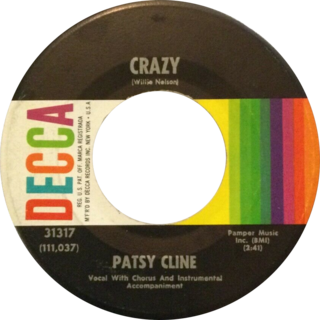
"Crazy" is a song written by Willie Nelson and popularized by country singer Patsy Cline in 1961. Nelson wrote the song while living in Houston, working for Pappy Daily's label D Records. He was also a radio DJ and performed in clubs. Nelson then moved to Nashville, Tennessee, working as a writer for Pamper Music. Through Hank Cochran, the song reached Patsy Cline. After her original recording and release, Cline's version reached number two on Billboard's Hot Country Singles, also crossing to the pop chart as a top 10 single.
"That's Life" is a popular song written by Dean Kay and Kelly Gordon and first recorded in 1963 by Marion Montgomery. The song has an uplifting message that, despite the ups and downs in life, one should not give up but keep positive, because soon one will be "back on top."

Shotgun Willie is the 16th studio album by American country music singer-songwriter Willie Nelson, released on June 11, 1973. The recording marks a change of style for Nelson, who later stated that the album "cleared his throat". When Nelson refused to sign an early extension of his contract with RCA Records in 1972, the label decided not to release any further recordings. Nelson hired Neil Reshen as his manager, and while Reshen negotiated with RCA, Nelson moved to Austin, Texas, where the ongoing hippie music scene at the Armadillo World Headquarters renewed his musical style. In Nashville, Nelson met producer Jerry Wexler, vice president of Atlantic Records, who was interested in his music. Reshen solved the problems with RCA and signed Nelson with Atlantic as their first country music artist.
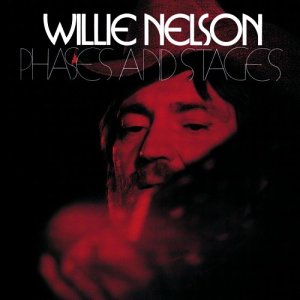
Phases and Stages is the 17th studio album by American country music singer-songwriter Willie Nelson, released in March 1974. It followed the moderate success of his first Atlantic Records release, Shotgun Willie. Nelson met producer Jerry Wexler at a party where Nelson sang songs from an album he planned to record. The single "Phases and Stages" was originally recorded the same year. Nelson recorded the album at Muscle Shoals Sound Studios in two days and Wexler produced it.
"That Lucky Old Sun (Just Rolls around Heaven All Day)" is a 1949 popular song with music by Beasley Smith and words by Haven Gillespie.

The Troublemaker is the 20th studio album by country singer and songwriter Willie Nelson. When Nelson refused to sign an early extension of his contract with RCA in 1972, the label decided not to release any further recordings. Nelson hired Neil Reshen as his manager, and while Reshen negotiated with RCA, Nelson moved to Austin, Texas, where the ongoing hippie music scene at the Armadillo World Headquarters renewed his musical style. In Nashville, Nelson met producer Jerry Wexler, vice president of Atlantic Records, who was interested in his music. Reshen solved the problems with RCA and signed Nelson with Atlantic Records as their first country music artist.

Yesterday's Wine is the 13th studio album and a concept album by country singer Willie Nelson. Nelson had been recording for RCA Victor since the early 1960s, and had released no significant hit records. By 1970, his recordings had reached mid-chart positions. Nelson lost the money he made from his song-writing royalties by financing concert tours that were generally unsuccessful and unprofitable. In addition to problems with his music career, Nelson had a troubled personal life. He had divorced his wife, Shirley Collie, and his Tennessee ranch had been destroyed by a fire.

The Party's Over and Other Great Willie Nelson Songs is the sixth studio album by country singer Willie Nelson.
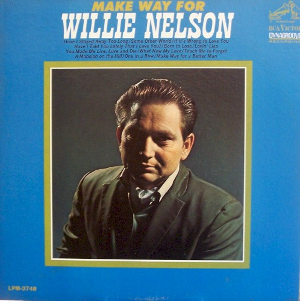
Make Way for Willie Nelson is the fifth studio album by country singer Willie Nelson.

...And Then I Wrote is the debut studio album by country singer Willie Nelson, recorded during August and September 1962 and released through Liberty Records.
"Yesterday's Wine" is the title track of the 1971 album of the same name by Willie Nelson. The track was also written by Willie Nelson. It later became a #1 duet for George Jones and Merle Haggard in 1982.
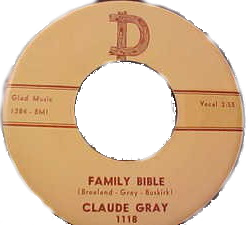
"Family Bible" is a song written by country music singer-songwriter Willie Nelson. Nelson began writing the song in 1957, while he enjoyed success as a disc jockey in KVAN, in Vancouver, Washington. After being denied a raise by the station, he moved to Houston, Texas. Due to financial issues he sold the song to Paul Buskirk.

"Mr. Record Man" is a song written by country music singer-songwriter Willie Nelson. After writing the song, Nelson moved to Houston, Texas, where due to his financial issues, tried to sell it to Larry Butler. Butler, who rejected to buy the song, employed Nelson instead. After his original songs turned into hits for other artists, Nelson was signed as a recording artist by Liberty Records.
"The Storm Has Just Begun" is a song by country music singer-songwriter Willie Nelson. Nelson wrote the song at the age of twelve. While working for KBOP in Pleasanton, Texas, in 1955, the song was one of the first two ever recorded by Nelson.

"Willingly" is a duet by American country music singer Willie Nelson and Shirley Collie, produced by Joe Allison during Nelson's third session for Liberty Records. Released in March 1962, the album reached number ten on Billboard's Hot Country Singles.
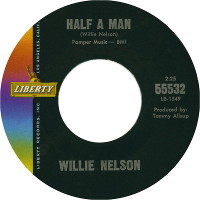
"Half a Man" is a song written and recorded by American country music singer Willie Nelson. The song was released as the A-side of the single for his second Liberty Records album, Here's Willie Nelson. Despite receiving mixed airplay for its content, the song became a sales success, peaking at number twenty-five on Billboard's Hot Country Singles and number twenty on Cashbox's country singles.
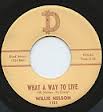
"What a Way to Live" is a song written by country music singer Willie Nelson. He recorded the song on his second session with D Records, after moving to Houston, Texas. Produced by Bill Quinn, it was cut at Gold Star Studios in March 1960.

"Touch Me" is a song written and recorded by American country music singer Willie Nelson. Leveraged by the success of his songs, Nelson moved to Nashville in 1960. Through songwriter Harlan Howard, Nelson was signed to write for Pamper Music, and to a recording contract with Liberty Records.

"The Party's Over" is a song written and recorded by American country music singer Willie Nelson during the mid-1950s. After arriving in Houston, Texas, Nelson was hired to play for the Esquire Ballroom band, where he would be allowed to close the shows singing the song. Guitar instructor and Nelson's friend Paul Buskirk forwarded the song to singer Claude Gray, who recorded the original version of the song, released as "My Party's Over" in 1959.
